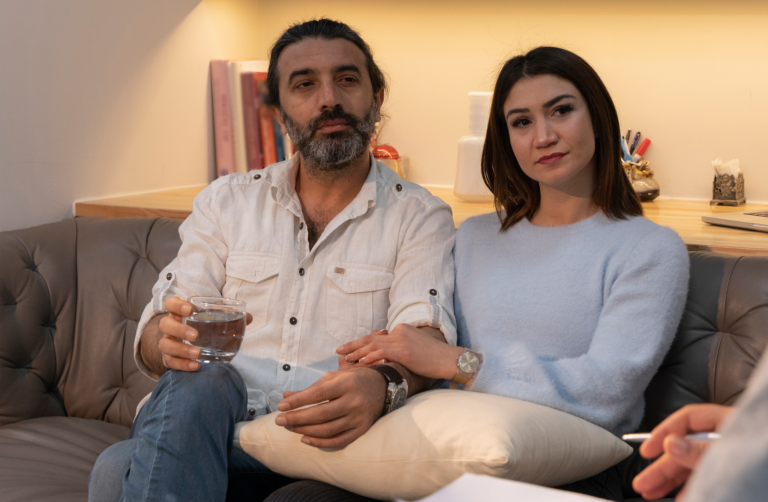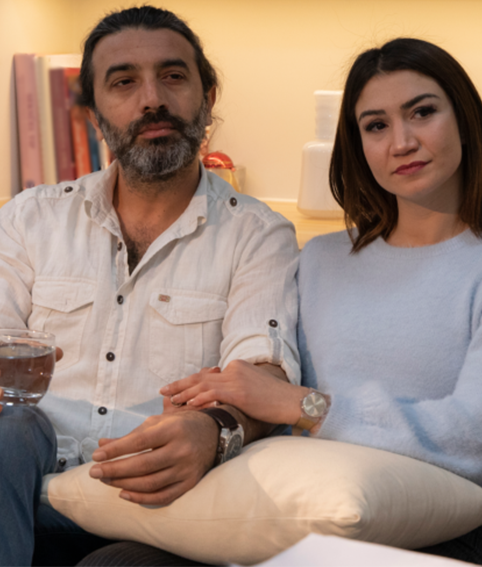Couples Therapy
Providing evidence-based therapies for couples of all ages and relationship statuses
For more than a decade, Dr. Tomassetti has worked with couples at all stages of their relationship, including before marriage and after divorce. Like individual therapy, the reasons that couples seek counseling are myriad. Some couples engage in therapy to prepare for cohabitation, recover from infidelity, improve communication, or to more effectively co-parent after a separation or divorce.




For distressed couples who find themselves engaging in repeated patterns or themes that make it difficult to resolve conflicts or experience a sense of fulfillment through the relationship, Dr. Tomassetti offers two forms of evidence-based couples therapy. Following your couples intake session, she will help you determine which is the better fit for your relationship needs:
Integrative Behavioral Couple Therapy (IBCT)
IBCT is an empirically supported intervention for couples in distress. It seeks to balance acceptance and change using principles of behaviorism. In IBCT, couples learn to reinterpret their partner’s behavior in a neutral to positive manner, communicate more effectively, and problem solve more efficiently. The result is that partners feel less polarized in the relationship and better able to work as a team.
Emotionally Focused Couples Therapy (EFT)
PROVIDING EVIDENCE-BASED THERAPIES FOR COUPLES OF ALL AGES AND RELATIONSHIP STATUSES
Whatever your reason for initiating services, Dr. Tomassetti will work alongside you and your partner to foster an environment where you feel safe to voice concerns, explore goals for treatment, and identify concrete behavioral changes to implement.
Through the use of evidence-based practices, Dr. Tomassetti equips couples with tools to become solution-focused in their relationship, creating a shift in perspective from pointing out weaknesses to acknowledging and appreciating one another’s strengths and differences. Adopting more adaptive behaviors and perspectives allows for growth and improvement in each couple’s relational well-being, which can positively impact other aspects of one’s life, within and outside of the couple’s relationship.
Integrative Behavioral Couples Therapy (IBCT)
IBCT is an empirically supported intervention for couples in distress. It seeks to balance acceptance and change using principles of behaviorism. In IBCT, couples learn to reinterpret their partner’s behavior in a neutral to positive manner, communicate more effectively, and problem-solve more efficiently. The result is that partners feel less polarized in the relationship and better able to work as a team. Studies have demonstrated long-lasting benefits from IBCT. In fact, couples who participate in IBCT, compared to traditional behavioral couples therapy, have been found to exemplify continued strengths in communication, be characterized by less negativity, and display fewer withdrawal behaviors two-years post-treatment (Baucom et al., 2011). IBCT has also resulted in couples experiencing increased satisfaction, stability, and intimacy (Christensen et al., 2004), resulting in decreased risk for divorce (Roddy et al., 2016). Furthermore, the benefits of IBCT have been found to extend beyond that of the couple’s relationship, in that research has demonstrated positive impacts on how the individual functions alone, how the individual co-parents with one they are no longer romantically involved with, and even extends to the functioning of one’s child/children (Gattis et al., 2008; Roddy et al., 2016).


Emotionally Focused Couples Therapy (EFT)
EFT is an evidence-based intervention for couples in distress. Through EFT, couples learn to better express their emotions, increase empathy, and strengthen secure attachment in the relationship. By focusing on your partner’s experience, rather than your own, opportunities arise for listening and problem-solving. Through this process, couples learn to spend less time explaining, and more time listening. EFT has been shown to increase emotional intimacy, leaving couples feeling more connected and satisfied with the health of their relationship (Roddy et al., 2016). Moreover, couples who undergo EFT often report feeling increased validation, encouragement, and support in their relationship, resulting in both partners feeling like their needs are being better met by the other (Byrne et al., 2004). In addition, research has demonstrated that those who participate in EFT experience more secure attachments in their relationship throughout treatment and post-treatment (Burgess et al., 2016). Having a more secure attachment with one’s partner can then lead to greater emotional connection and security, as well as increased understanding, acceptance, and even improved self-esteem.
